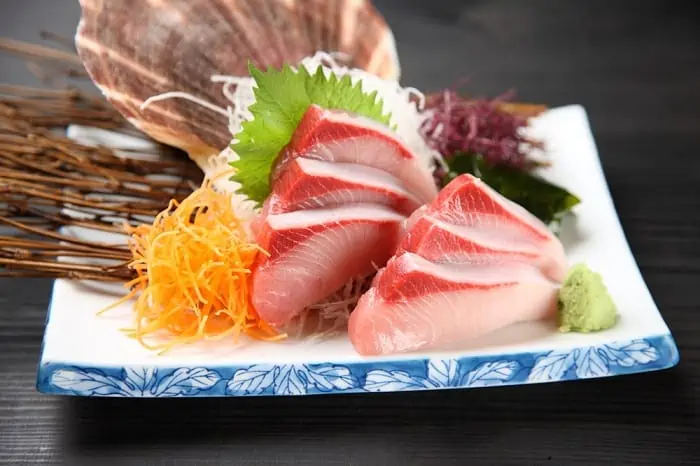Amberjack has an enticing buttery taste that comes with a mild sweetness. The soft and flaky texture of this fish enhances the flavors. People usually have a love it or hate it relation with amberjack.
The name amberjack stands for a group of different fish. Like with most other fish, the preparation techniques affect what does amberjack tastes like. As a priced game fish, it attracts lots of people with its fighting spirit and flavors.
Amberjack often shows a kind of worm infestation in the lower parts. This pleasant-tasting fish makes a perfect grill using simple ingredients. Different amberjacks have different qualities in taste, size, habitat, etc. Delectable as sashimi, you will miss out a lot by turning away from this fish.
Can you Eat Amberjack?
Yes, you can eat amberjack without any worries. They pack an excellent mixture of taste and health benefits. Many people love the flavor of this fish. But some others harbor the opposite opinion as well.
Worm infestations are common in wild amberjacks. These tapeworms called spaghetti worms mainly live in the tail-end of the fish. Don’t eat it raw if any worms get found. These worms are not usually harmful to humans. You can cut off these parts or can opt for farmed raised amberjacks. Freezing offers another way to kill the worms and make the fish safe to eat.
Anglers love amberjack because they don’t give up without a fight when getting caught. Though edible and tasty, many people catch these fish for the fun they offer. Amberjack is delicious if you have fresh fish and know how to cook it.
Is Amberjack Good to Eat?
Amberjacks are delectable. The flavor can go wrong in the wrong hands, so you better be careful. Proper handling from right after the catch will preserve the taste.
Amberjack does well with many different cooking methods. The flesh is firm, so it holds shape with any method you use. It tastes great when grilled, smoked, poached, and baked. Grilled amberjack is the star on this menu.
Amberjack offers a rich protein source. It contains a high quantity of mega-3 fatty acids that can protect our hearts. Vitamin A and D improve the health of your eyes and immunity. Phosphorus and potassium present make it an even more attractive choice.
Amberjacks you get from the market will be the greater or yellow-tail amberjack. The lesser amberjack rarely gets encountered by fishermen as they live in the deep sea. They are also less in numbers. But don’t worry; all are equally good with some slight variations in taste.
What does Amberjack Tastes Like?
Amberjack has a light taste that doesn’t repel you with fishiness. You will enjoy every bit of its juicy deliciousness. The flavor feels sweet and buttery. The succulent, firm flakes release the unique taste of amberjack with every bite. This fish has rich umami that elevates the flavor profile several folds.
We cannot say that amberjack doesn’t taste fishy at all. You can imagine a mild to medium range of fishiness to this fish. The flavor will still be pleasant, so anyone can try it out without hating it. The mildness will not be anywhere near the taste of salmon or tuna. But amberjack feels much less gamey than king mackerel.
You will hear many mixed opinions on the taste of amberjack. Freshly cooked ones do have a pleasing flavor. The taste goes vile with the diminishing freshness. Flavors will vanish if the fish gets overcooked. The texture becomes dry and hard, preventing you from tasting any flavor.
The taste of amberjack also depends on the ingredients used for cooking. Using strong-tasting ingredients masks or kills its iconic flavor. This fish has an oily side to it but is rather palatable.
Some parts of amberjack taste better than others. Loins give the best-flavored fillets with large flakes. Taste reduces in other parts. Darker areas, i.e., the areas with bloodline, taste unpleasant. You need to remove these before cooking, or else they can destroy the flavor.
Amberjack tastes flavorful as sashimi and sushi. The distinct flavor and firm texture offer a delightful experience. You can sense the sweetness in the subtle but bold taste that does not feel fishy. The bad reputation of worm infestation may pull you back from raw consumption. But farmed amberjack, the hiramasa, can end the confusion and offers a tastier treat.
Do Different Types of Amberjacks Differ in Taste?
The Greater amberjack has a tougher texture due to its predacious, fast-swimming nature. It has a leaner, cleaner flavor than the Japanese amberjack that gets deeper with age. The light-colored flesh, when eaten raw, has a nice crispy feel to it. It arises from the low-fat content. The fish with bright red bloodlines will give the best taste. Its color changes to brown when the fish loses its freshness.
Mature Japanese amberjacks have a deep flavor. They tend to be oilier than the younger ones and firmer in texture. Young Japanese amberjacks are full of umami. They have a sweetness lined with a slight acidity that lingers on your tongue when eaten raw. Farmed raised varieties have fattier flesh with softer consistency.
Wild yellowtail amberjack has a similar taste to greater amberjack. But there is a sashimi-grade variety of yellowtail that gets farm-raised. Called by the name hiramasa, this fish offers an exquisite flavor. It is lighter, sweeter, fattier, and tastes great when eaten raw. The firm texture carries the richness of umami that can seep you up.
Lesser amberjacks are smaller and have a milder taste. The proportion of red and light parts differs from that of the larger varieties. It affects the taste as the bloodline could overpower the flavor.
Do Grilled Amberjack Tastes Good
Grilled amberjack can tantalize your senses with its charming flavors. The firm flesh of amberjacks absorbs the marinades well and doesn’t lose its shape. Bloodlines should get removed to ensure a clean, delicate taste. The smoky tint on the fish makes it a simple dish worthy of your time.
Conclusion
Amberjack has a subtle but deep flavor to it. The buttery juiciness of the fish offers an outburst of savory flavor. It enchants our taste buds with the faint sweetness accompanying the firm texture. Amberjack doesn’t have much fishy taste. The pleasant flavor wears down with time and turns distasteful.
Amberjacks have plenty of omega-3 fatty acids in them. They also contain Vitamin A, D, phosphorus, and potassium. You will find that the name amberjack denotes some different fishes called jacks. The flavor profile, size, and appearance may vary within this group.

